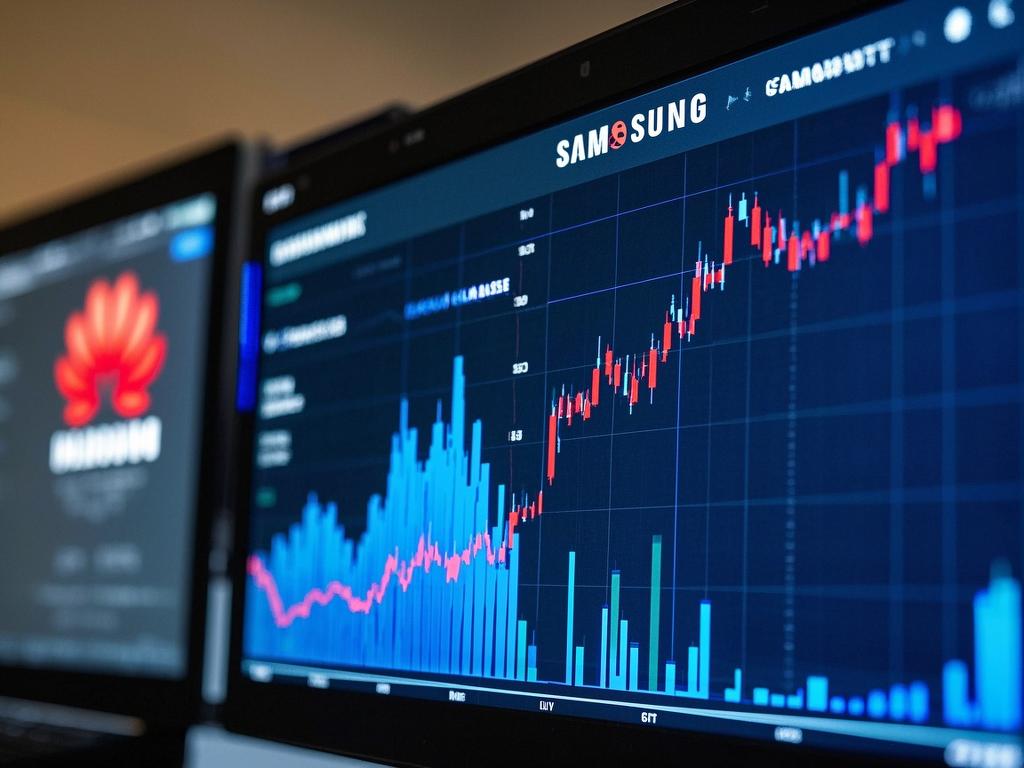
# Samsung vs. Huawei Stocks: Tech Giants in Global Race
In the high-stakes arena of the global tech market, Samsung and Huawei stand as two titans, their stocks navigating the volatile waters of innovation, competition, and geopolitical tensions. As a stock analyst, I'm here to take you on a wild ride through the ups and downs of these tech behemoths' stock performances, armed with data, insights, and a healthy dose of irreverence.
Let's start with Samsung, the South Korean electronics juggernaut. Samsung has long been a dominant force in the global tech landscape, with a product portfolio that spans smartphones, tablets, wearables, and memory chips. The company's stock has been a favorite among investors for its consistent revenue growth and strong dividend payouts.
However, Samsung hasn't been immune to challenges. The smartphone market has become increasingly competitive in recent years, with the rise of Chinese manufacturers like Huawei and Xiaomi. Samsung has also faced regulatory scrutiny in various markets, including the United States, over issues related to intellectual property and trade.
Despite these challenges, Samsung has managed to maintain its market share and financial stability. In the second quarter of 2021, Samsung reported a net profit of 10.17 trillion won ($8.9 billion), up 23% from the same period last year. The company's revenue for the quarter reached 77.26 trillion won ($67.6 billion), driven by strong sales of its smartphones, memory chips, and display panels.
Looking ahead, Samsung's stock performance will likely be influenced by a number of factors. One of the key drivers of growth for the company will be its continued investment in 5G technology. Samsung is one of the leading suppliers of 5G infrastructure equipment, and as the global rollout of 5G networks accelerates, the company stands to benefit from increased demand for its products.
Another factor that could impact Samsung's stock performance is the ongoing trade war between the United States and China. The two countries have imposed tariffs on each other's goods, which has had a negative impact on global trade and economic growth. Samsung has a significant presence in both the US and Chinese markets, and any further escalation of the trade war could have a detrimental effect on the company's revenue and profitability.
Now, let's turn our attention to Huawei, the Chinese tech giant that has been at the center of a global controversy in recent years. Huawei has been accused by the US government of posing a threat to national security, despite the company's repeated denials of these claims. As a result, Huawei has been banned from doing business with US companies and has faced significant challenges in accessing key markets around the world.
Despite these challenges, Huawei has continued to innovate and grow. The company is a leading provider of 5G technology, and it has also made significant investments in artificial intelligence, cloud computing, and other emerging technologies. In the second quarter of 2021, Huawei reported revenue of 135.7 billion yuan ($20.9 billion), down 29% from the same period last year. The company's net profit for the quarter reached 15.05 billion yuan ($2.3 billion), down 57% from the same period last year.
Looking ahead, Huawei's stock performance will likely be influenced by a number of factors. One of the key challenges for the company will be its ability to navigate the ongoing trade war between the United States and China. The US government has imposed a number of restrictions on Huawei, including a ban on the company's products and services, which has had a significant impact on the company's revenue and profitability.
Another factor that could impact Huawei's stock performance is the company's ability to expand its market share in key markets around the world. Despite the challenges it has faced, Huawei has continued to invest in research and development and has launched a number of new products and services in recent years. The company is also exploring new markets, such as Africa and the Middle East, where it sees significant growth opportunities.
So, which tech giant's stock is the better investment? Well, that's a question that's impossible to answer with certainty. Both Samsung and Huawei are facing significant challenges, but they also have significant strengths and opportunities. As a stock analyst, I would recommend that investors carefully consider their investment goals, risk tolerance, and investment horizon before making any investment decisions.
In conclusion, the battle between Samsung and Huawei is far from over. These two tech giants will continue to compete for market share and innovation in the global tech market, and their stock performances will likely be closely watched by investors around the world. So, stay tuned for the latest developments, and get ready for a wild ride in the world of tech stocks!
What are your thoughts on the Samsung vs. Huawei battle? Do you think one company has a clear advantage over the other? Let me know in the comments below!

